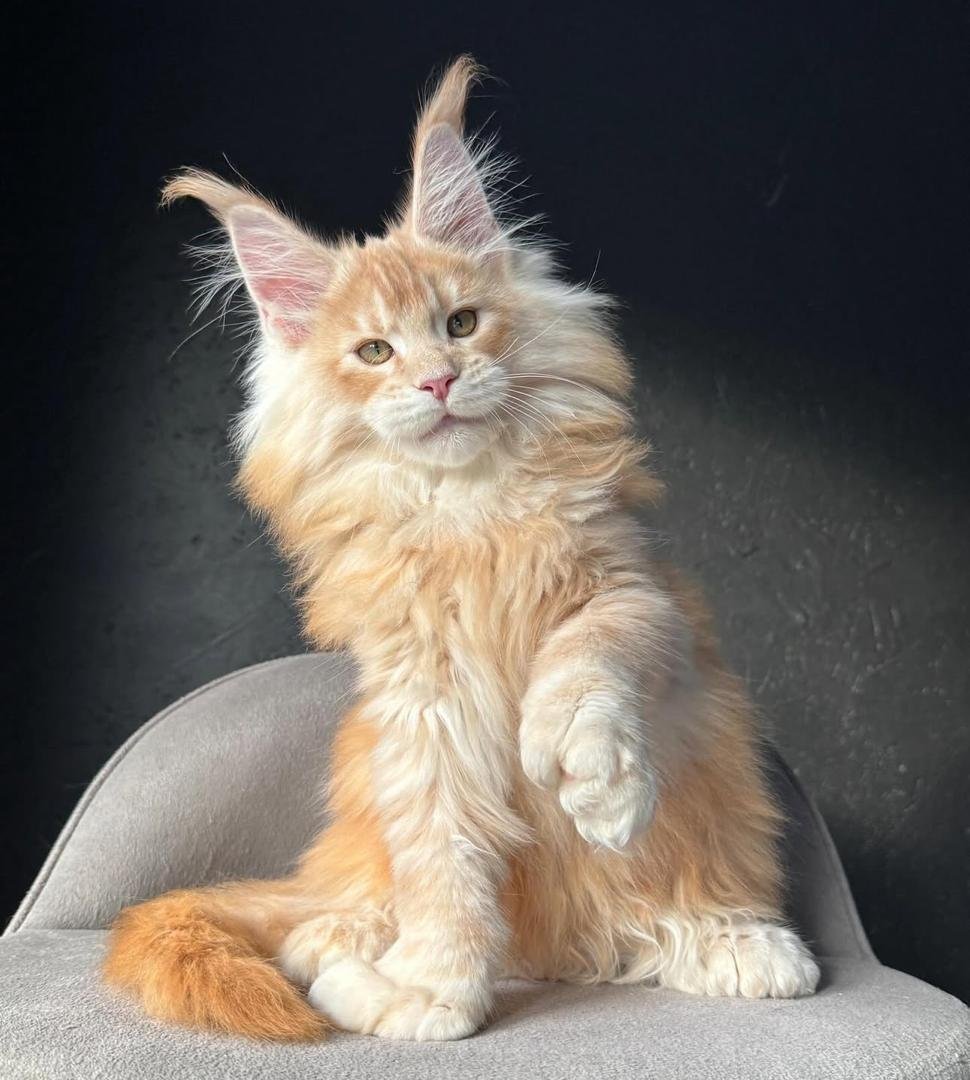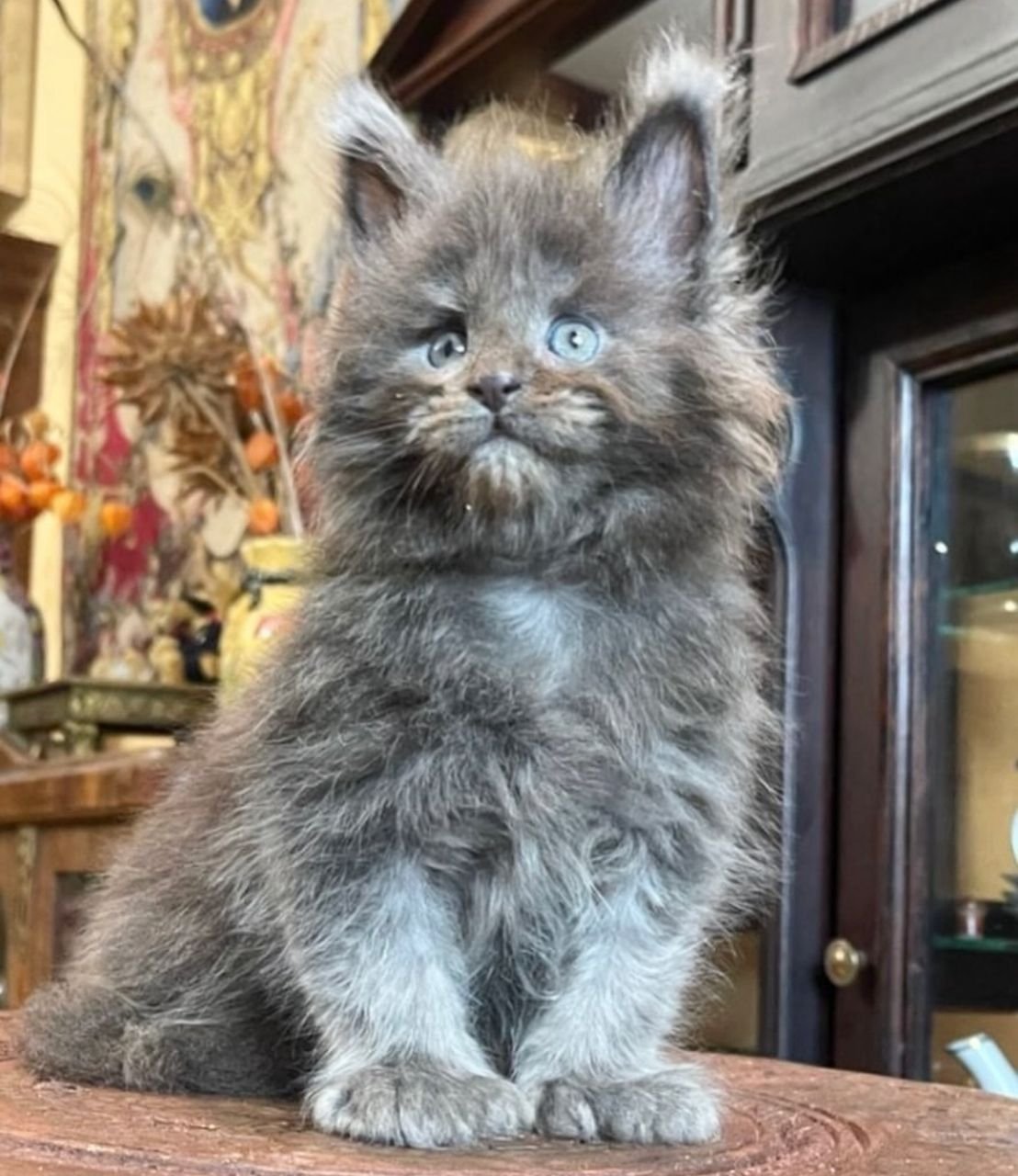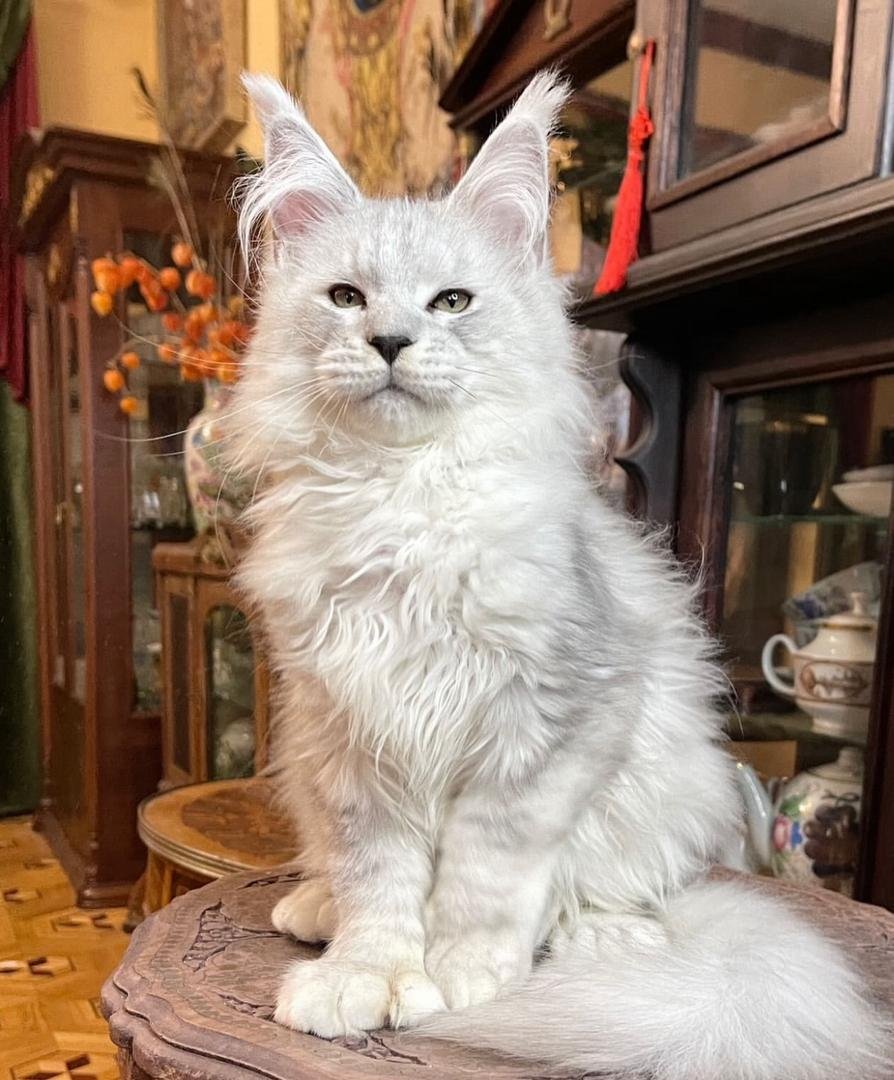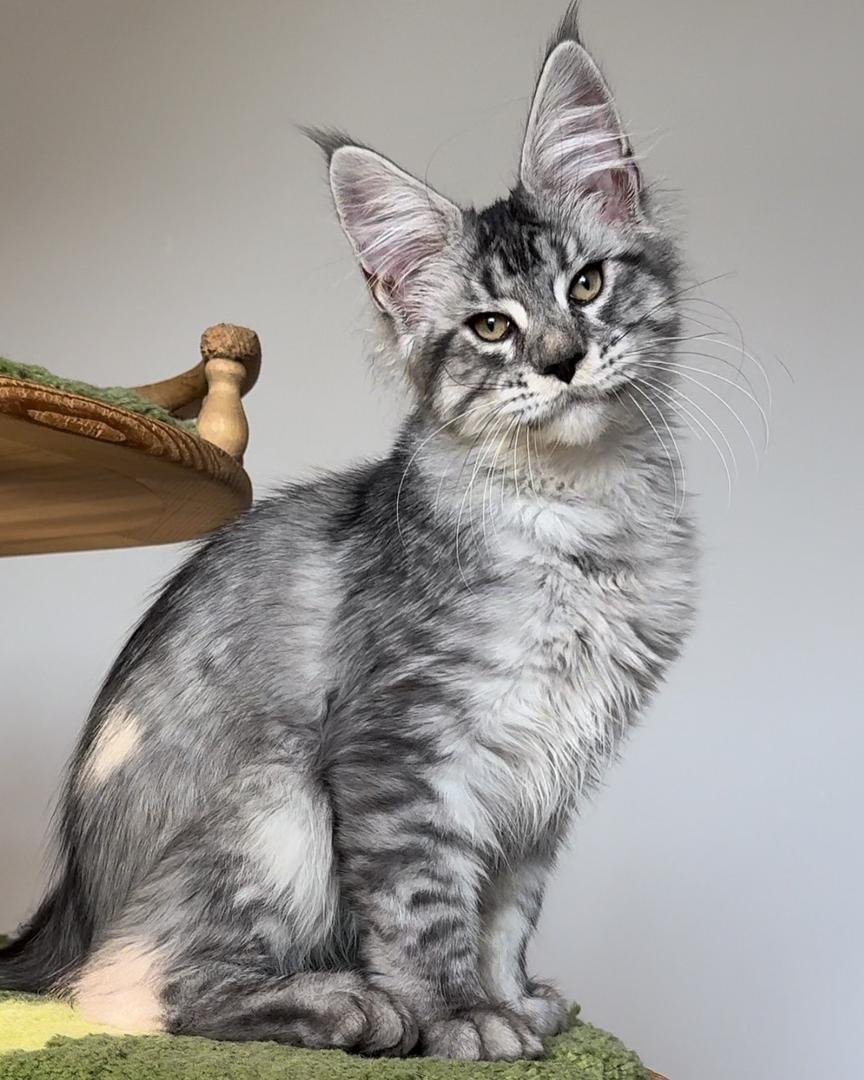Maine Coons are often called the gentle giants of the feline world. They are one of the most beloved and impressive breeds today. Their large size, fluffy coats and dog-like-personality make them stand out. But when you want to buy a Maine Coon or adopt one as a pet, it is very important to know their personality, care needs, and lifestyle requirements to see if they truly fit your home or not.
With this guide, you will be able to learn everything you need to know, from the friendliness and care level to their food, behavior, and other information that will allow you to choose if a Maine coon cat is the right pet for you.
Why Are Maine Coon Cats Good Pets
A Gentle and Intelligent Temperament
Maine Coon cats are good pets because of their gentle, affectionate, and intelligent nature. Despite their large size, they are one of the most family-friendly cats you can own. The breed is highly social and loves to stay around their family members.
Usually, they trail behind their owners from one room to another, find playing fetch very amusing, and give their attention when you talk to them. The mix of dog-like temperament, loving character, and beautiful looks makes them hard to resist for a lot of cat lovers.
Adaptable to Any Home Environment
Though Maine Coons have large size, they are highly adaptable. Whether you live in a large house or a smaller apartment, a Maine Coon will fit perfectly if they get enough vertical space for climbing and, crucially, regular interaction with their human companions.
According to our experience, we can confidently say that their social nature means their primary need is you, not square footage.
Are Maine Coons Friendly with Kids & Other Cats?
Maine Coons are very friendly with kids and other cats and even dogs. Their gentle temperament and friendly disposition are well-known. Because of this, they are often called “social butterflies”. They also enjoy companionship without being overly demanding.
If you have children at home, a Maine coon can be an excellent family pet for you. Because of their patience and playful demeanor, they become ideal companions for an active family life home. Similarly, they’re tolerant around other pets, adapting easily when introduced properly.
In short, Maine Coons are loving but not overly demanding. They are sociable, yet their presence is not excessively vocal; a perfect mixture for many families.
Owning a Maine Coon Cat – What to Expect
Owning a Maine Coon cat is a joyful but long-term commitment. They are playful, loyal, and curious cats that thrive on attention and interaction.
When buying a kitty from us, many people ask a common question: are Maine Coons high maintenance? The answer is yes a bit. They are high maintenance compared to other short-haired breeds. Because of their long silky fur, they require brushing 2–3 times a week to prevent mats and tangles. Regular grooming also helps control shedding.
Are Maine Coons Hard to Take Care Of?
Maine Coons are not hard to take care of but they need consistent care. After owning a Maine coon cat you’ll need to maintain their grooming, provide a high-protein diet, and give them daily playtime. As they are very social cats, they need regular interaction and can’t be left alone for long hours.
If you’re ready for moderate grooming and active engagement, a Maine Coon can be a delightful addition to your family. To learn more in depth about all care requirements, please refer to our dedicated guide on caring for Maine Coon cats.
Maine Coon Personality and Behavior
People fall in love with this breed because of their unique behavior. They are very playful, active and social. They like training sessions and interaction with toys.
Maine Coons often act like dogs. They enjoy games like fetch, follow their owners around, and sometimes even greet you at the door the same way dogs do. If you love to see your kitty friend showing dog behavior, a Maine Coon can be a great fit for you.
Do Maine Coon Cats Talk or Meow a Lot?
They don’t meow a lot, but it varies from cat to cat. Though Maine Coons can’t talk like human beings, they “chirp” and “trill” more than they meow, using these gentle sounds to communicate affection or curiosity.
One of our customers shared their thoughts with us about his cat meowing. He said, “My cat was silent for two years but has been loud ever since — every night we “argue” when he wants to go out. He meows as if he is saying “out” and when I arrive at the car he talks to me. When he is trying his luck, he purrs so nicely to persuade me. Interestingly, cats only “meow” to people — they reserve trills and songs for other felines.”
Common Maine Coon Behavior Problems
Maine Coons are clever and sometimes hard to please. If they are not occupied, they can either ruin the furniture or call for their owner’s attention nonstop. One of the best ways to make them happy is by providing them with interactive toys and climbing trees.
Maine Coon Length Chart: Understanding Their Size Before You Adopt
When you think of having a Maine Coon as a pet, the biggest size is an important consideration. They rank as one of the largest domestic cat breeds and their impressive, mighty structure can influence your choice — particularly if you are living in a small place or restricted space.
| Age | Average Length (Nose to Tail) | Average Weight (Male) | Average Weight (Female) |
|---|---|---|---|
| 3 Months | 10–12 inches (25–30 cm) | 3–4 lbs (1.4–1.8 kg) | 2.5–3.5 lbs (1.1–1.6 kg) |
| 6 Months | 14–18 inches (35–45 cm) | 7–10 lbs (3.2–4.5 kg) | 6–8 lbs (2.7–3.6 kg) |
| 1 Year | 20–24 inches (50–60 cm) | 10–15 lbs (4.5–6.8 kg) | 8–12 lbs (3.6–5.4 kg) |
| Fully Grown (3–5 Years) | 30–40 inches (76–101 cm) | 15–25 lbs (6.8–11.3 kg) | 10–18 lbs (4.5–8.1 kg) |
Maine Coons are full grown around 3–5 years old, unlike most cats that finish growing by age two. With long bodies, bushy tails, and strong form, they give off an impressive stance, which is why they are called the lion cats.
Why Size Matters in Choosing a Maine Coon
Because of their size:
- They will require litter boxes that are larger, scratching posts that are bigger, and furniture that is stronger.
- They will still not be suitable for very small apartments if you are not prepared to dedicate a place for them to stretch and move around freely.
- Their food needs are a bit more than the average cat’s because of their muscle mass and active lifestyle.
If you have enough space and time, their size becomes part of their charm — they’re big, beautiful, and gentle companions.
Health & Grooming Needs
Maine Coons Health Issues
Maine Coons are generally healthy, but potential owners should be aware of a few hereditary issues like hypertrophic cardiomyopathy (HCM), hip dysplasia, and spinal muscular atrophy (SMA), and polycystic kidney disease (PKD).
All responsible breeders should carry out genetic screening on their breeding cats for these diseases. Before getting a kitten, always ask the breeder for a certificate of the negative screening results.
As a trusted and reputable cattery, we at AffordableMaineCoonKittens prioritize health. The kittens that you will find here come along with health certificates. Here are some of the healthy and available kittens:
Diet & Eating Habits
A Maine Coon cat typically consumes 200–300 calories per day depending on age, weight, and activity level. Studies show Maine Coons tend to have larger body size and altered metabolism compared to other cats.
Best Diet for Maine Coons
A high-protein, low-carb diet is the most effective option. Because Maine Coons are large cats with a prolonged growth period, our veterinarians recommend providing premium quality cat food with real meat listed as the primary ingredient. We also suggest incorporating wet food regularly to their diet to aid hydration, a common issue for many cats.
Lifestyle & Fun Facts
Water Fascination
Running water is such a wonder to them, they will often actively try to play with it by dipping their paws in the water or coming up to the sink with you.
Maine Coon Maintenance Cost
In addition to purchase price, the estimated yearly expense for grooming tools, high-quality food, and vet visits is expected to be around $500 to $1,000, which will be considered as the primary ongoing care cost. For a complete breakdown of initial and long-term expenses, and tips on cost reduction, please see our dedicated blog post on Maine Coons initial and maintenance cost.
Typical Maine Coon Litter Size
A typical Maine Coon litter includes 4 to 6 kittens, though some can have more depending on genetics and health.
Buying or Adopting a Maine Coon
If you decide to welcome a Maine Coon, always look for reputable breeders or trusted rescues.
How to Buy a Maine Coon Cat Safely
- Request health certificates for HCM or SMA and other genetic diseases.
- Go to the breeder’s place or request live video tours.
- Don’t go for offers that look like “too good to be true.”
Adoption Tip:
You can get a Maine Coon kitten from our Affordable Maine Coon Kittens. We have both adopted and available for sale. Some kittens includes:
Maine Coon Pros and Cons
Pros
- Highly Affectionate and Friendly: These pets are well-known for their affectionate, canine-like loyalty and their constant need to be around their owners.
- Intelligent and Playful: Their intelligence, coupled with their very active and attractive playful character, makes them the best family or children interactive pets.
- Highly Adaptable: They are the easiest to fit in all kinds of environments and lifestyles, whether small flats or big houses.
- Loyal and Social: Being a very social breed, they create deep, loyal relationships and more often than not, get along well with other animals.
Cons
- Requires Regular Grooming: Their thick and long fur needs to be brushed at least three times a week to avoid painful tangling.
- Above-Average Food Consumption: The fact that they are big and grow slowly makes them depend on and consume more high-quality food than the average house cat.
- Needs Adequate Space: They are large, lively cats and therefore require a lot of room (both up and across) to exercise and have fun without any restrictions.
Potential for Genetic Health Issues: If breeding and genetic screening are not done responsibly, they are prone to hereditary diseases (e.g., HCM, Hip Dysplasia).
Common FAQs:
No. Despite their large size, Maine Coons are gentle, friendly, and non-aggressive. They pose no threat to humans.
Yes. They are social, affectionate, and easygoing—great for beginners as long as you can keep up with moderate grooming and their playful energy levels.
Yes, Maine Coons typically eat more due to their large size. Portion control and quality food help prevent obesity.
Maine Coons are expensive because breeders invest in genetic testing, proper care, vaccinations, and long breeding processes. Their popularity and large size also increase demand.
No cat is completely hypoallergenic. However, many people find Maine Coons easier to tolerate compared to other long-haired breeds due to their unique coat texture.
A Maine Coon kitten you may love to see:

Rusty
4-month-old male — Orange Maine Coon Tabby Mix
- Color
- Warm orange coat with creamy highlights on chest, face & paws
- Pattern
- Subtle tabby stripes and swirls blended into a rich orange fur
- Ear Tufting
- Pronounced lynx-like ear tufts — classic Maine Coon trait
- Fur
- Long, full ruff around the neck and a thick, flowing tail
Final Verdict – Are Maine Coons Good Pets for You?
The Maine Coon is undoubtedly the most preferred option if you are seeking a companion that is loyal, social, and majestic all at once. These cats are incredibly balanced companions since they share a dog’s affection and a cat’s independence at the same time.
But before you bring one home, be certain that you can devote enough time, space, and care to him/her. By the right grooming, feeding, and attention, a Maine Coon would not only be a great pet but also a loving family member for many years to come.





